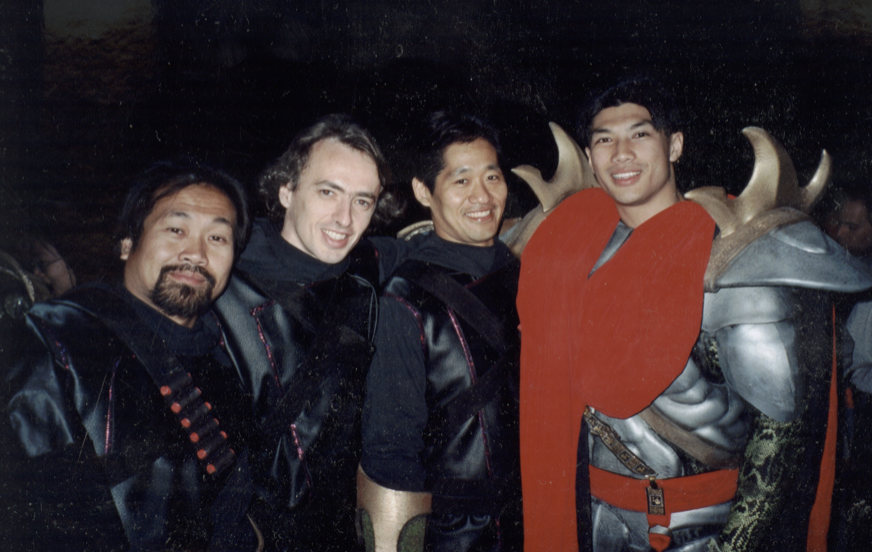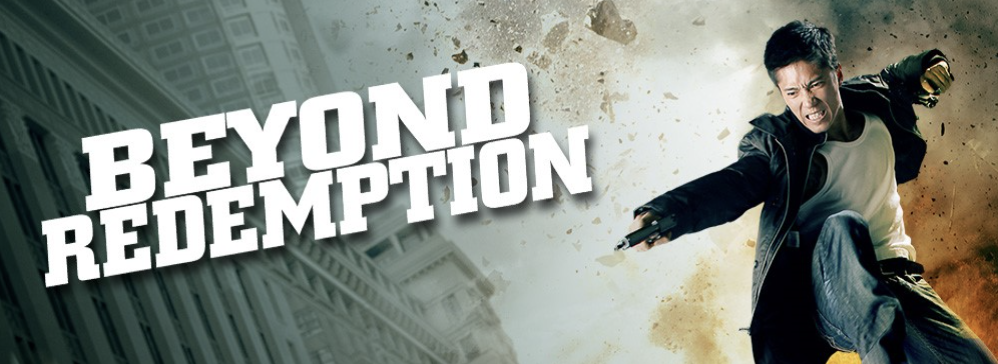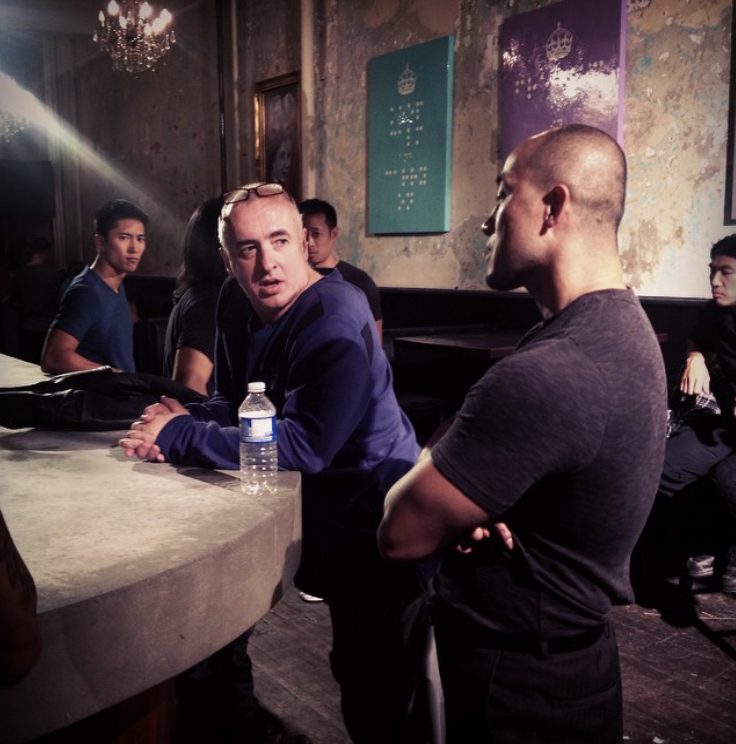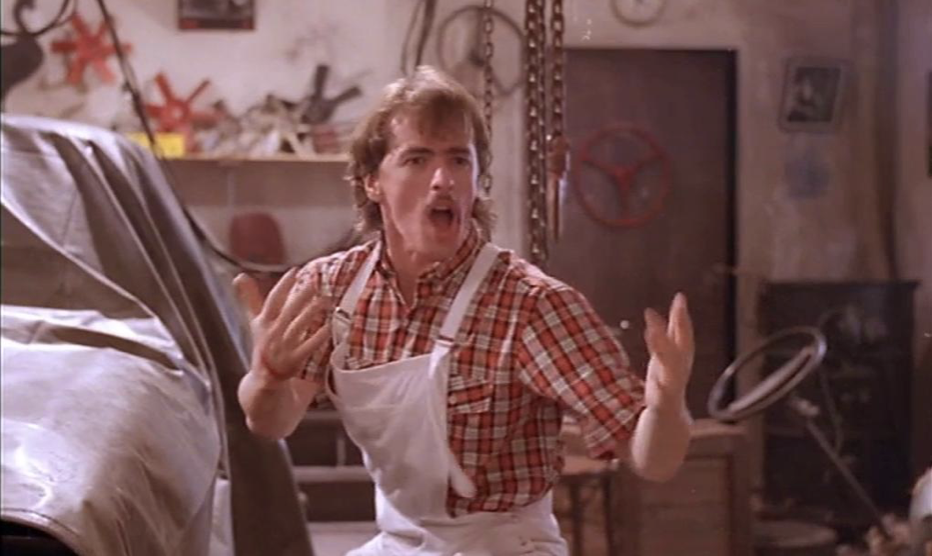Grossing $HKD 39 million upon opening in February 1991, Jackie Chan’s Operation Condor was a resounding success at home and abroad, cementing itself in the pantheon of Hong Kong action classics. Things only seemed to be looking up, not only for the British colony’s top tier filmmakers, but everyone associated with the local film industry including Western stuntmen like Bruce Fontaine.
But an over-saturated market, shifting audience tastes and an impending regime change as Hong Kong prepared itself for a handover back to China caused enough of a tremor that opportunities for guys like Bruce began to dry up. This necessitated a more stable day job that actually caused him to lose out on the fewer and fewer opportunities that became available.
Meanwhile, the film industry back in Vancouver had seen immense growth since the Beachcomber days. With major shows like X-Files and 21 Jump Street setting up residence and even filmmakers like Jackie Chan himself taking advantage of the welcoming film climate with Rumble in the Bronx, the time seemed right for this young man to return to the west coast (in an easterly direction) and bring his hard won Hong Kong sensibilities to a continent that was just beginning to discover them. But would the old-guard stunt cowboys in Hollywood North be so welcoming?
We’ll ask the man himself as our chat continues:
Do you see or work with Jackie again after wrapping Operation Condor?
Yeah, quite a bit. After Operation Condor, things started to take a bit of a slide. Hong Kong action films took a major dive at the time (early/mid-1990s). There was still a few, but not a lot. I ended up getting a real job. I get a call from Jackie and he’s like “Hey, you wanna work on Supercop?”. I was pulling 60-hour weeks minimum and was stuck in a spot where, do I could quit for a few days on this film? A lot of those shows, you get promised 10-20 days and you actually get two days. There were no contracts to pay you what you might have gotten. Mostly it was a handshake. So I declined Supercop and to this day, I regret it. There’s a scene where I was supposed to be in with Kim Marie Penn where they said we were gonna go to Malaysia for.
Most of the guys I knew were leaving Hong Kong. Vincent Lynn, Ken Goodman, Dan Mintz, they all just started leaving. I think it was only me, Mark Houghton and Mark King that were left.
I saw Jackie quite a bit actually. I got invited to one of his birthday parties which was just absolute chaos. They had an open bar, all you’d want to drink, anything no charge. I had worked with Jacky Cheung on a film called Curry & Pepper and there was another guy named David Wu, an American-Chinese guy. We got shit-faced drunk together. I was hungover for three days!
I was there on Drunken Master II during the ending fights. In fact, I got offered a part but again declined. Again, to my regret in hindsight. I was there for probably a week or two because Jackie will spend a lot of time on his ending scenes. That whole thing where Ken Lo holds his foot up in the air and takes his glasses off, his foot was wired. In fact, Ken and I used to go to the same gym and I remember him stretching like crazy getting ready for that role. He was saying “I’ve gotta get ready for Jackie!”.
When he did Rumble in the Bronx, I actually came back to Canada and he said “If you stay long enough, I’ll let you be in it”. I was like “Nah, I’m kinda over it now”. Bung I hung out on set and it was always cool.
So I saw Jackie a lot for the last four years that I was there. It’s not like we were drinking buddies, but you know, I was always welcome on set and he did offer me parts. Timing was just bad for me I guess.
I’m shocked at how many classic Jackie titles you ended up turning down.
I really wanted to do Drunken Master II, but it was just one of those things. I didn’t know they would end up being (classics). It’s like “Do I go back to living in a hostel, worrying about how to pay the rent?”. I had a nice apartment. When you’re a manager in an American firm, you get a lot farther with the ladies than a stunt guy. They’re more impressed with guys in management.
Did Jackie ever reach out to you when he was shooting Shanghai Noon in Alberta?
I had been back in Canada for about two years. I would get the odd gig, but I was hitting a lot of closed doors here. I rang up my buddy Fong (Operation Condor assistant director) and asked if there might be a spot for me. He talked to Jackie, got back to me and said they were having a lot of trouble getting their stunt guys over there through immigration and also having trouble with the stunt coordinator.
They shot in Alberta and the stunt coordinator was one of these old cowboy types who felt that since he already had guys, that they didn’t need to be bringing all these other guys in. Fong said I should try to get through this guy. I got nothing from that particular stunt coordinator. I eve said “Look, I can speak some of the language, I can be your go-between” and the guy wouldn’t even respond to me. That was pretty much where Shanghai Noon didn’t go for me.
That’s a shame
The stunt community is a lot different now then at the time I came back. It was what I call the “Old Boys Cowboy Network”. They liked to really keep a control on things and they weren’t to welcoming to someone they perceived as an outsider.
I got hired for a Wesley Snipes movie Futuresport and the American coordinator, Jeff Ward, was a huge fan of Asian Cinema. He found out about me and he says “These other guys don’t like you. You’ve got something they don’t. You’re a threat”.
Then, I think he thought he was helping me though it honestly did me more harm than good, they did a big audition with all the stunt guys and he asked me to explain to all the stunt guys what they had to do for the audition. We’re talking all the old boy network and I’m the guy that they’ve never been that friendly to.
I’d say “Okay guys, you’re gonna be roller-blading and I’m gonna swing the hockey stick. You gotta jump over that and go around there and crash”. When we went to camera, he was saying “Okay Bruce, change into this. We’re gonna put a moustache on and you’re gonna be a different guy”. He just kept putting me all over in these little spots where I’d be the guy taking the hits for the various heroes.
 Bruce Fontaine unmasks the cast of Ninja Turtles: The Next Mutation
Bruce Fontaine unmasks the cast of Ninja Turtles: The Next Mutation
What lessons were you able to apply from your time in Hong Kong to your Vancouver film career?
Almost nothing. Here’s the thing: numerous stunt guys would be hanging out with me, we’d watch something Asian and frequently they’d say “Why can’t we make it look like that??”. In Hong Kong they’d never do master shots. Everything is in little pieces. They’re a lot more loosey-goosey with the lighting, so they can afford to do that. They don’t shoot multiple angles or tons of coverage and they do what I call “editing-in-the-head”.
I remember on Ninja Turtles where after rehearsal we went to shoot. I remember standing next to the guy, his name was Dean and the director said that we were gonna do a big wide master then go do the other side, re-light and do another master, then get into some coverage. I lean over to Dean and go “What the fuck is a master??”. I had no idea.
He said “Well, we’re gonna shoot the whole fight in one go” and I go “What??! How do ya do that??”. It didn’t make sense to me. In Hong Kong, they’re very specific about camera placement, hitting their marks and they roughly know how they’re gonna edit as they’re shooting. Here, it’s completely different.
I later got hired as a fight coordinator on a couple occasions and they’d say “We want that Hong Kong thing”. Just to give you an example, one day one of the stunt coordinators said “Alright, I want you to do this scene. Go get whoever you like. I want you to shoot the fight for me”.
Back then, they used to just get a camera and let the guys run the whole fight in a wide master. I already had the first version of Adobe Premiere, kinda self-taught myself based on how I’d seen Jackie cutting. I shot the angles that worked the best, I knew how I was gonna edit it. I had done a little bit of filming myself. I did a little bit of choreography for IFD, so I kinda knew how to place the camera. I had learnt what works tight, what works wide.
I did essentially a pre-viz. I showed it to the stunt coordinator, an old cowboy. He looked at it and was like “It’s got different angles and cuts! Who picked the angles?”. I said I did. “Who did the editing?”, again I said me. He asked how long it took and I said couple hours on the fight and a couple more editing. Honestly pretty quick and easy. You know what he said? “Don’t show this to anybody”. He didn’t want anybody to see it.
Later I saw some of the stuff these guys shot and clearly these stunt coordinators never go to the video village. Here, they’ll set something up, a fall, a fight, giving no thought whatsoever to how it’s shot. Partly because it’s been a different system here and the hierarchy is different. I learned that there was nobody who was going to be receptive to me saying “Frame this bit here. It’s gonna look good”.
I remember I got hired by the former producer and writer of Kung Fu: The Legend Continues to substitute for one day on Max Havoc. They had this guy, Mickey Hardt, who had just spent several seasons working under Donnie Yen on a German series called The Puma. Donnie is magnificent in terms of shooting action and Mickey had basically been groomed on Donnie Yen in this German series.
I remember when I got on set, Mickey had already shot a bit with the other coordinators and was going “I’ve never shot like this before.” I said “You’re not used to masters, are you?”. When I come in, they kept shooting master after master. The poor guy was actually very talented, working with someone I’d worked with numerous times, Dean Cain. Dean is a super guy (pun intended), but he’s not a fighter.
We were in this house where they were super anal about not damaging anything. Dean couldn’t get past two or three moves, but they insist on shooting master upon master. I remember saying “Honestly guys, this is such a short scene, I could have you outta here in 30 minutes”. They said “Oh? What would you do?”. So I said “For this part, you only need to shoot this angle from this point to this point and it’s gonna look fine”. It was literally not even 15 movements. They said “Which angle?” and I said “Frame it like this”.
The DP frames it, they go to shoot it, and the director tells the DP to do a wide master again. I said “You’re doing the same thing I just told you not to do! You don’t need to cover all that stuff ’cause these guys are gonna fall apart by the time you get halfway through the take!” Ultimately they listened to me and it actually worked out.
What I’m saying is that there was no openness or reception to filming the way that I had learnt in Hong Kong. What I did learn for my own purposes was a marriage of the two. Hong Kong never did pre-vis although now they do. They would just shoot and make up the choreography as they went. But because they were so good at doing it that way, it always looked good. They had a good eye because martial arts is such a big thing in the culture.
When I do stuff now, I kinda go “Okay, for lighting I gotta shoot my tights before I go to my wides” or reverse depending on what the case is. So I think the best thing I learned from Hong Kong was to marry it with what we do here.

Tell us about your directorial debut, Beyond Redemption.
Darren Shahlavi (best known as the boxer from Ip Man 2) was a very close friend and Osric Chau was a wushu student of mine. Both of those guys had deep, long discussions with me about their careers and asking me what they should do. The conversations were similar.
At the time they happened, I had just had my first child and was having a lot of internal conversations with myself. I gave some advice to Darren about pursuing his dream and these conversations made me reflect. My wife has a lot of rich Mainland Chinese friends. One of them had a big house, they went back to China and gave us a key to look in on it once in a while.
We were there one night and I said “Do ya think they’d let me make a movie (here)?” because I’d always wanted to make a movie since the day I got back here but I just couldn’t get anything going. I’m a stunt guy and who’s gonna let a stunt guy make a movie?
So the people in China said “Sure, you can use our house” and that’s honestly how it started. I just started calling all the people who would eventually be in my film and said “I don’t have any money yet, but we’re gonna do it”.
I had some guy promise me $85k. It fell through and became $10k. I played a shell game, I lied through my teeth, I told everybody I still had my budget. I shot some footage, raised another $35k, and shot the film for $45k.
We had constant problems because everybody in that film were all working stunt guys and actors. My lead, Brian Ho, had to go do Marco Polo. My main bad guy Don Lew was gonna be on Warcraft and Osric was constantly going off for comic cons. So we had to improvise constantly, almost Asian-style.
It was a 30-day shoot over a year, just because we had to keep juggling everybody’s schedules. Almost everybody except for Eddy Ko worked for free (Eddy’s agent insisted on some money). We had Vancouver Film School students as our crew, guerrilla shooting all over the city with lots of little mishaps and adventures.
 Director Bruce Fontaine sticks with water at the open bar set of Beyond Redemption
Director Bruce Fontaine sticks with water at the open bar set of Beyond Redemption
We shopped it around to about 30 companies for distribution after showing it at VAFF (Vancouver Asian Film Festival). Around Christmas we had a deal fall though, but within two weeks, we had 24 offers.
I’ll be the first to say Beyond Redemption isn’t perfect, it’s flawed, but I think we delivered good action scenes for the budget. I’ve had distributors say that they can’t believe I did it for $45k. We made it to Netflix, we’re in 30-something countries, in hotels, two Chinese airlines. It did fairly well for us and opened some doors.
I’ve been able to get discussions going with other distributors. Unfortunately COVID killed everything just as we were beginning to make headway. But I’ve still got other projects in development.
Anything you can tell us about?
I’m currently short-listed with Netflix India. I have two Indian Vancouver-set action films with an Indian cast. People don’t know it, but we’ve got a lot of bankable Indian stars that reside here in Vancouver. I have some good connections with some Indian film people. I actually took over direction on an Indian film called Killer Punjabi. But that’s a different story.
We signed a deal in February for female Rambo-meets-The Fugitive story. Unfortunately, all the markets fell apart so no pre-sales have been made yet. I’ve got a couple other projects with Russian and Mexican investors so I’m just trying to nail the next one down, but COVID is making things difficult. We’ve got stuff cooking, but nothing I can say is concrete.
Thanks for taking the time to share with us about your long and storied career.
No problem. Let me know if you need any pictures. 😉
Beyond Redemption can be found at fine VOD providers and still-standing video stores everywhere. Here’s a trailer.

